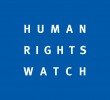Rostock, Germany — On the second day of the G8 summit, leading
international debt cancellation advocacy groups issued a strong call that
the debt deal G8 leaders negotiated two years ago has not solved the debt
crisis of Liberia. The advocacy groups called on the G8 to take immediate
action to cancel Liberia�s debt.
�While the international community is moving to bring Liberian dictator
Charles Taylor to justice for his crimes against humanity, the G8 is
delaying the debt relief that Taylor�s victims urgently need to rebuild
their war torn country.� Said Lancedell Mathews of the New African
Research and Development Agency, a representative of the country�s
platform of Development NGOs. �The G8 must cancel Liberia�s debt now.�
Two years ago at Gleneagles, the G8 committed to delivering extra debt
relief for heavily indebted poor countries. At the time, the G8 were
aware they were cutting into resources set aside for countries like
Liberia that were yet to enter the tortuous course of their debt relief
mechanisms. And yet, this is exactly what is happening in the case of
Liberia as donors still squabble as to how to clear Liberia’s arrears to
the International Monetary Fund, the World Bank and the African
Development Bank.
In 2004, Liberia emerged from civil war. Today, with an annual budget of
only US$130 million, President Ellen Sirleaf Johnson and Finance Minister
Antoinette Sayeh are trying to free Liberia from the its external debt.
Over the past two decades, Liberia accumulated an incredible US$3.7
billion in foreign debt, US$1.3 billion of which was provided by the World
Bank and the African Development Fund and the remaining US$2.4billion is
owed to many creditor countries, including the US, Germany and South
Africa.
�These debts are clearly unsustainable and must be written off�, said Gail
Hurley of EURODAD, the Brussels based European Network on Debt and
Development. �The Liberian people are not responsible for this debt, they
did not profit from it and they can not repay it,� she continued.
The loans were contracted by a series of repressive regimes starting from
the 1970s and leading up to Charles Taylor, President of the country prior
to 2003.
�These loans were used to finance the extraction of the country�s
resources like iron ores and diamonds, the benefits of which went to
investors, creditors and brutal regimes, not the people of Liberia,� said
Lidy Nacpil of the Jubilee South network. �The Liberian people suffered
countless Human Rights violations like torture, forceful displacements,
physical mutilation. The debts are clearly illegitimate and must be
written off immediately,� she continued.
�The IMF and World Bank must overcome some of their bureaucratic hurdles,
to facilitate the writing off of their claims against Liberia
immediately,� says Peter Lanzet of the German debt cancellation network
erlassjahr.de. To speed up the development efforts of the country the
bilateral debt must be cancelled outside the recent debt cancellation
initiatives offered to a list of the 40 poorest and most heavily indebted
countries. Of these 40, 22 countries have so far been able to get relief
from it. Others could not fulfil the conditions of the International
Monetary Fund and therefore, have not been included. To subject the
peoples of Liberia to the same terms and conditions is to deny that
Liberia�s creditors bear a considerable part of the responsibility for
fuelling Liberia�s suffering and Civil War.
IMPORTANT NOTICE: INBOX is an archive of press releases, statements, announcements, letters to the editors, and manifestos sent to Davao Today for publication. Please email your materials to davaotoday @ gmail.com. Davao Today is not responsible for the content of these materials. The opinion expessed in these items does not reflect those of Davao Today and its staff. Please refer to our terms of use/disclaimer.
World









